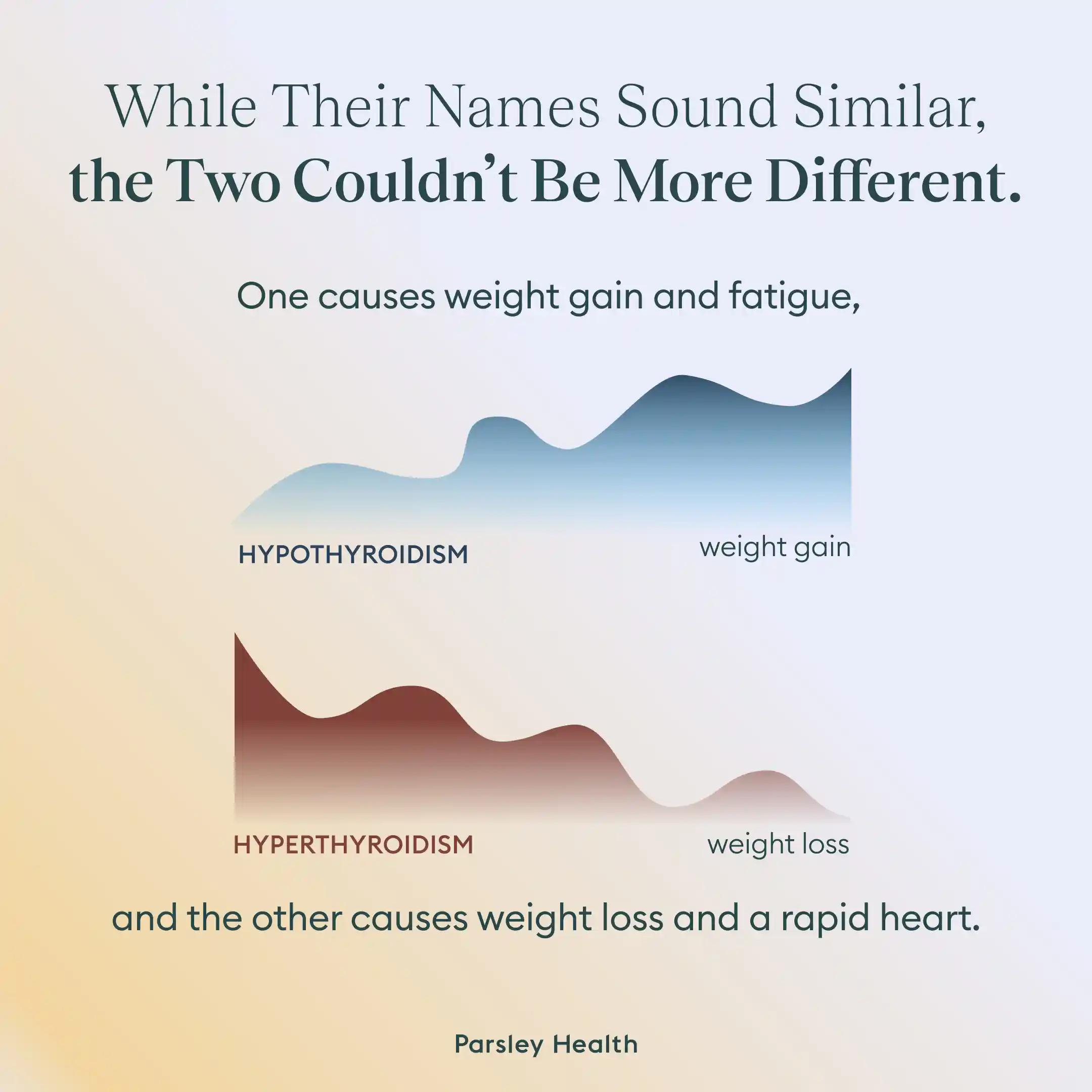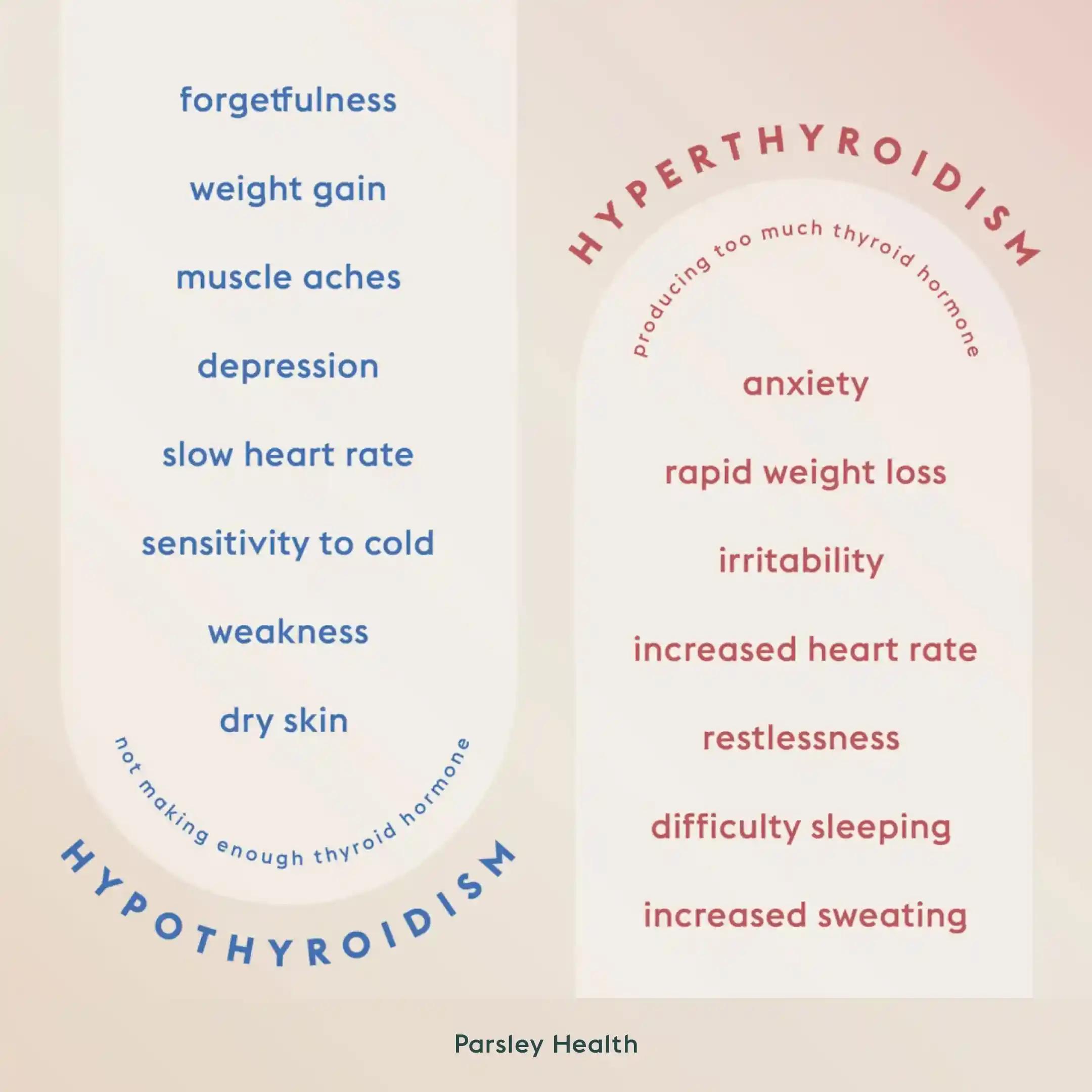Hyperthyroidism and hypothyroidism are easy to get mixed up. Both are medical conditions involving the thyroid gland, each can have far-reaching impacts on your overall health, and their spelling differs by only two letters.
But that’s just about where the similarities end. Hyperthyroidism is when the thyroid gland produces excessive hormones and speeds up the metabolism and hypothyroidism is when the gland produces less than normal and slows the metabolism. Ahead, we’ll dive into the similarities and differences between hypothyroidism vs hyperthyroidism, including each condition’s symptoms, causes, and treatment options.
Understanding thyroid disorders
The thyroid is a gland located in the front of the neck. It produces hormones that control the body’s energy levels. These hormones influence important bodily functions, including metabolism and the body’s development. They also impact your heart rate, mood, and even breathing. Basically, you can think of the thyroid as one of the MVPs for your overall health.
And when there’s a problem with the MVP, it often has a ripple effect on the entire team. In this case, the ripple effect depends on what type of thyroid problem someone is experiencing. Two of the most common are hyperthyroidism and hypothyroidism.
While their names sound similar, the two couldn’t be more different. One causes weight gain and fatigue, and the other causes weight loss and a rapid heart. These differences stem from how each condition impacts the thyroid gland’s activity.

“Generally, hyperthyroidism speeds things up while hypothyroidism slows things down in terms of metabolism, causing different symptoms,” explains David Nazarian, MD, the medical director of My Concierge MD in Beverly Hills.
Not sure what your symptoms are really telling you?
The Parsley Symptom Index helps connect the dots across your whole body so you can understand patterns, not just isolated symptoms.
Causes of thyroid disorders
Hyperthyroidism and hypothyroidism share two potential causes: Thyroiditis and Hashimotos’ disease. Thyroiditis causes inflammation in the thyroid that can either speed up or slow down thyroid hormone production. Hashimoto’s is an autoimmune disorder that initially can cause hypothyroidism, among other complications. As the gland gets destroyed, it can lead to permanent loss of thyroid function and hypothyroidism. But these aren’t the only potential causes.
For hyperthyroidism, other potential causes include:
- Graves’ disease: This autoimmune disorder is the most common cause of hyperthyroidism in the US and tends to impact younger adults.
- Overactive thyroid nodules: These lumps in the thyroid are usually harmless, but can become overactive, triggering too much activity in the thyroid.
- Iodine or thyroid medication: Too much thyroid medication or iodine can cause hyperthyroidism.
- Thyroid adenoma: Benign lesions in the thyroid gland sometimes cause hyperthyroidism (in about 1% of cases).
- Toxic nodular goiter: A condition where the thyroid gland is enlarged and produces more thyroid hormone than is necessary.
Conditions that can exclusively cause hypothyroidism include:
- Postpartum thyroiditis: 10% of women experience temporary hypothyroidism after giving birth. There is a chance, albeit small, for this postpartum slowing of the thyroid to become permanent.
- Treatment to manage Graves’ disease: In one study, 38.5% of participants who used medication to treat Graves’ disease ended up developing hypothyroidism, because Graves’ treatment slows thyroid activity.
- Medications: Some medications can lead to hypothyroidism, including but not limited to, amiodarone, thalidomide, and oral tyrosine kinase inhibitors.
- Radiotherapy: Radiation therapy, a type of treatment for cancer, can sometimes lead to hypothyroidism if it targets the head or neck.
- Radioactive thyroid treatment: Commonly given for Graves’ disease, this treatment can lead to long term hypothyroidism.
Hypothyroidism vs hyperthyroidism symptoms
Hypothyroidism and hyperthyroidism share a couple of symptoms including fatigue, mood changes, and the potential development of a goiter, which is when the thyroid becomes so enlarged, that the neck looks swollen.
Those three symptoms, however, are where the similarities begin and end. In fact, the two conditions often impact the body in contrasting ways, as demonstrated by the two lists of symptoms below.

Hypothyroidism symptoms
While hypothyroidism symptoms vary on a case-by-case basis, some of the most common are:
- Constipation
- Depression
- Dry skin
- Fatigue
- Fertility issues
- Goiter
- Joint pain
- Heavier menstrual cycles
- Irregular menstrual cycles
- Muscle pain
- Puffiness in the face
- Thinning hair
- Trouble tolerating cold weather
- Slower heart rate
- Sweating less often
- Weight gain
Hyperthyroidism symptoms
Like hypothyroidism, hyperthyroidism symptoms differ from person to person. The most common include:
- Difficulty sleeping
- Diarrhea
- Increased anxiety or irritability
- Irregular or rapid heartbeat
- Fatigue
- Goiter
- Loss of appetite
- Mood swings
- Muscle weakness
- Trouble tolerating warmer temperatures
- Tremor in the hands
- Weight loss
- Withdrawal from others
Symptoms also differ by age. Some symptoms, such as withdrawal from others and loss of appetite, are more common in adults over 60, for example.
Diagnosing thyroid disorders
“Both conditions are diagnosed through a physical exam and blood testing,” says Dr. Nazarian. Sometimes, an imaging test, such as an ultrasound or radioactive iodine uptake test, is ordered as well.
For blood testing, a medical provider will check the levels of thyroid-stimulating hormones (TSH), mainly thyroxine (T4) and triiodothyronine (T3), in the patient’s blood. High levels of T3 and T4 indicate hyperthyroidism while low levels suggest hypothyroidism. A functional medicine provider will use a more comprehensive panel that includes TSH, free T3, free T4, reverse T3, and thyroid antibodies (TPO and TgAb), resulting in a more complete picture of thyroid function.
Healing stories from our members
Treatment options for thyroid disorders
Once diagnosed, a medical provider will work with you to develop a treatment plan. That treatment plan varies from person to person and should take into account your lifestyle, diet, medical history, and if you have hypothyroidism or hyperthyroidism.
It also varies based on whether you seek treatment from a traditional or functional medicine approach. The latter approaches the root causes as well as the symptoms, while the former doesn’t treat the root cause.
Treatment for hypothyroidism
“Treatment of hypothyroidism usually involves taking thyroid hormone pills every day,” says Raj Dasgupta, MD, chief medical advisor for Fortune Recommends. These medications replace the hormone your body isn’t naturally creating. Once prescribed, most people take hypothyroidism medication for life—but that doesn’t mean you can ghost your medical provider after you get your initial prescription.
Those with hypothyroidism should have regular check-ins with a medical provider, which can involve additional blood work. At the six to eight week mark, for example, your medical provider will order another blood test in order to ensure the levels of thyroid hormone are where they should be. Depending on TSH levels, they may adjust medication dosage. They will test again around the six-month mark and then once annually to make sure the medication is working as it should.
Treatment options for hyperthyroidism
“There are many treatment options for hyperthyroidism depending on the cause,” says Dr. Dasgupta. The four main options include:
- Beta-blockers: This medication class stops substances, such as adrenaline, from harming nerve cells. Beta-blockers don’t stop thyroid production, but reduce hyperthyroid symptoms.
- Anti-thyroid medications: Medications in this class reduce the amount of hormone produced by the thyroid gland.
- Radioiodine therapy: This common treatment involves swallowing pills or liquid with radioactive iodine-131, which destroys the thyroid. Many on this treatment end up developing hypothyroidism and going on lifelong medication.
- Surgery: If other treatment options don’t work, a medical provider may recommend surgery to remove part or all of the thyroid. “Medical providers do not often recommend surgery, because the other treatment choices are safer and less costly,” adds Dr. Dasgupta.
The best medication depends on many factors, including symptoms, if you’ve tried other hyperthyroid treatments before, and pregnancy status. Pregnant people, for example, aren’t candidates for radioiodine therapy. Similar to most medical conditions, consult a medical provider about which treatment is right for you.
Managing thyroid disorders
Alongside medications and other prescribed treatments, lifestyle modifications can help heal the thyroid—and treat the condition’s root cause. Lifestyle changes often impact what’s on your plate, your mental health, and your daily movement.
Diet
Certain micronutrients have been linked to a lower chance of developing a thyroid disorder—and better symptom management, should someone be diagnosed with hyper or hypothyroidism. These micronutrients include iodine, selenium, iron, zinc, vitamin B12, D3, and A.
A notable diet that has all of the above is the Mediterranean diet. Someone on this diet eats little to no poultry, red meat, gluten, or lactose. Instead, they prioritize foods such as:
- Whole grains (like quinoa, brown rice, and oatmeal)
- Vegetables
- Legumes (such as lentils or chickpeas)
- Oily fish
- Red wine
Stress management
“Treatment of hypo and hyperthyroidism are essentially the opposite,” says Dr. Dasgupta, “However, stress management techniques like regular exercise, meditation, or yoga can support thyroid health overall, as stress can impact hormone balance.” A 2024 study backs this claim; it looked at women of child-bearing age and found that those with higher stress levels also had more disruption in TSH production.
Alongside yoga, regular exercise, and meditation, other effective stress management techniques include breathwork, laughing, and spending time in nature.
Lifestyle changes
Alongside diet, exercise, and stress relief, other everyday choices impact the chances of developing a thyroid problem and/or how a thyroid condition progresses. A 2021 study suggests inadequate sleep, an ultra-processed diet, smoking, and a sedentary lifestyle were all linked to thyroid disorders.
Fortunately, there are also clear guidelines on habits that help prevent a thyroid problem from developing or can manage symptoms if someone already has a condition. Three of the most effective lifestyle habits include:
- Improve sleep habits, aiming to get seven to nine hours of sleep a night
- Exercise or moving your body five to seven days a week
- Don’t smoke and if you do, make an effort to quit
Changing up all four at once could be overwhelming. Instead, focus on one or two ways to build up a better exercise routine, sleep habits, or diet.
“Consistency is key,” advises Dr. Dasgupta, “Making small but steady changes, like eating a nutrient-rich diet and finding ways to handle stress, can make a big difference in how you feel every day.”
Parsley Health offers physician-led functional medicine care, advanced lab programs, and flexible ways to get started, all designed to help you feel better over time.
Complications of untreated thyroid disorders
“It is very important to follow up with your medical provider for regular monitoring of your thyroid hormone levels to determine if treatment needs to be adjusted or kept the same,” says Dr. Nazarian. Without regular check-ins, both conditions can lead to complications.
Undertreated hypothyroidism has the potential to turn into a myxedema crisis or coma. Myxedema crisis is marked by seizures, cardiogenic shock, respiratory failure, and too much fluid retention. It can lead to sepsis (an extreme response by the immune system) hypoglycemia (when blood glucose levels are abnormally low) or arrhythmias (an irregular heartbeat).
In severe cases, it may progress into delirium, organ dysfunction, or even a myxedema coma, an often fatal condition where the body begins to shut down because there isn’t enough thyroid hormone being produced.
Untreated hyperthyroidism can lead to what’s known as a thyroid storm. This storm creates a hypermetabolic state where someone experiences fever, excessive sweating, anxiety, and tachycardia, a heart rate over 100 beats per minute. Thyroid storms may cause life-threatening complications, such as organ dysfunction, stroke, and other acute cardiovascular events.
Frequently Asked Questions (FAQs)
What is the difference between hypothyroidism and hyperthyroidism?
Hypothyroidism is when the gland produces less than normal and slows the metabolism. It is often marked by weight gain and low energy levels. Hyperthyroidism is the opposite—the thyroid gland produces excessive hormones and speeds up the metabolism.
Which is easier to treat, hypothyroid or hyperthyroid?
Hypothyroidism, when the thyroid gland produces less and slows the metabolism, is often easier to treat than hyperthyroidism. Hypothyroidism typically progresses slower, and medications are often more effective.
Do you gain weight with hypothyroidism or hyperthyroidism?
Typically, someone gains weight with hypothyroidism. Hypothyroidism slows down the production of hormones that are responsible for controlling metabolism, the chemical reactions that convert food into energy. With hyperthyroidism, the thyroid gland produces more of these hormones, often resulting in weight loss.
Is high TSH hypo or hyper?
High thyroid-stimulating hormone (TSH) levels are associated with hypothyroidism. Hyperthyroidism occurs when TSH levels are low.
What are the symptoms of hypothyroidism and hyperthyroidism?
Hypothyroidism often causes low energy levels, weight gain, and difficulty tolerating the cold. Hyperthyroidism symptoms include anxiety, a faster heartbeat, and weight loss. Both can cause fatigue, changes in mood, and the development of a goiter.
Final Thoughts
While the names sound similar, hypothyroidism and hyperthyroidism impact thyroid hormone production and our overall health in different ways. A hyperthyroid is when a thyroid gland produces too much TSH, while a hypothyroid is when the gland produces too little TSH. Despite their differences, they have one important commonality: Both require medical treatment.
If looking for an experienced functional medicine provider that can assess the root cause of a thyroid disorder and curate a personalized treatment plan, consider Parsley Health. Our experienced team gets to the root of what’s causing a thyroid condition and addresses that condition with a mix of lifestyle and medicinal treatments.









